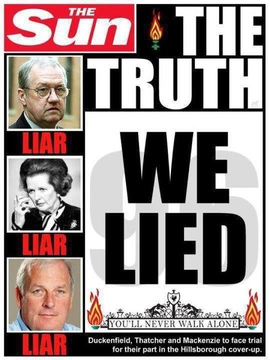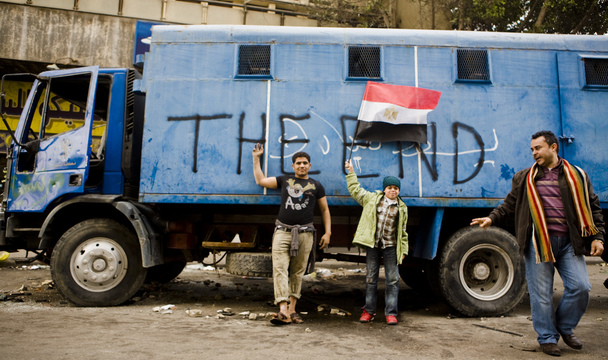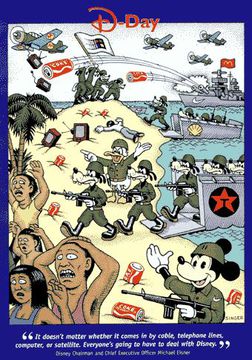Search results for 'culture'
Tahrir Square
Ten Theses on WikiLeaks
These 0.
"What do I think of WikiLeaks? I think it would be a good idea!"
(after Mahatma Gandhi's famous quip on 'Western Civilisation')
The End of a Paradise
In tactical media circles the Amsterdam media landscape has long been treated as a Utopian model because of her free radios, open tv-channels and digital public spaces. The last few years this media paradise is under threat. How did this come about? And is it still possible to reverse this development? This is the theme of the Amsterdam Media Debate. Nina Meilof (The Digital City - DDS), Andreas Baader and Josephine (Radio Patapoe), Frank (Radio de Vrije Keyser) and media-activists Patrice Riemens, Geert Lovink and Menno Grootveld prepared the grounds for the discussion.
The aim of the Amsterdam Media Debate during The Next 5 Minutes is to explain to the international participants that big changes are underway here. They may perhaps learn something from our experiences, but we would also like to try and find out what the differences are with other big cities and with other countries. What are these big changes and how is the situation at the present moment?
Dr. Shahidul Alam Detained and Released on Bail - Demand to Drop all Charges: #FreeShahidulAlam
Dr. Shahidul Alam, internationally renowned photographer, activist, founder and Managing Director of the Bangladesh multimedia company, Drik, founder of Chobi Mela International Photography Festival and Pathshala South Asian Media Institute, was forcibly abducted from his home on the night of 5 August.
Shahidul Alam was granted bail on November 15, 2018 and released from jail, but still faces a maximum of 14 years in prison if convicted.
News and updates #freeshahidulalam
Report: Public Debate 'Vox Populi and The Syrian Archive'
Summary of the presentations and public debate on digital archiving practices, activism, and the role of the artist.
Report of the event Vox Populi and the Syrian Archive on 21 January 2017, organised by Eric Kluitenberg..
Nikeground - Rethinking Space
On 14 October, the net culture institution Public Netbase was served a writ intended to prohibit a work of art. The writ was the result of a lawsuit filed by Nike corporation, with a disputed amount of 78,000 Euros. The space installation "nikeground ? rethinking space" is a joint project of Public Netbase and the renowned art group 0100101110101101.ORG. The renaming of the historic Karlsplatz square in the center of Vienna into Nikeplatz, as suggested by the project, is meant to encourage reflection and public debates. In their work, the authors combine the artistic tradition of mythopoesis with the new culture of communication technologies.
ReadMy Postmodernism - My '80s
Filmmaker and activist Gregg Bordowitz's passage through the
1980s mirrors the course of AIDS activism in that decade. From the very
first ACT up demonstration in New York to the triumphal storming of the
FDA headquarters outside Washington, DC, he deployed his art in the
battle against AIDS. Bordowitz leads off this two-issue series of
personal chronicles of the decade, recounting his experiences as an
activist and guerrilla filmmaker at the forefront of the fight.
"Art
does have the power to save lives, and it is this very power that must
be recognized, fostered, and supported in every way possible."
- Douglas Crimp, introduction to AIDS: Cultural Analysis/Cultural Activism (MIT Press, 1988)
Digital Partisans
On Mute and the Cultural Politics of the Net
Moments Within the Movement: A Conversation
Devin Allen and Stephanie Renée on the power of photography and citizen activism in contesting social injustice Fields of Knowledge
ReadHands Up United
Ferguson is everywhere. From St. Louis to Ayotzinapa to Palestine, millions are rising together to resist discrimination and State terrorism.
Wikileaks: The Syria Files
Today, Thursday 5 July 2012, WikiLeaks began publishing the Syria Files -
more than two million emails from Syrian political figures, ministries
and associated companies, dating from August 2006 to March 2012.
Dictionary of War - Berlin Edition
A to Z: The Precarious Alphabet of War
War, in the broadest sense, is a battle about the power to define and definitions, that are not carried out at the center of words but at their very margins. But what can words do, as soon as the state of war has become a rule and a normality worldwide?
Dictionary of War - Munich Edition
The second edition of DICTIONARY OF WAR, July 22 and 23 in Muffathalle Munich
ReadBeautiful Trouble - A toolbox for revolution
Introduction
By Andrew Boyd & Dave Oswald Mitchell
"The clowns are organizing. They are organizing. Over and out."
-Overheard on UK police radio during action
by Clandestine Insurgent Rebel Clown Army, July 2004
Pussy Riot Statement
Pussy Riot : Art or Politics?
Art, Resistance and Rebellion on the Net
Call to join the cybernetic edition of CompArte "Against Capital and its Walls, All the Arts"
July, 2017
Tactical Media Connections
A public research trajectory tracing the legacies of Tactical Media and its connections to the present.
Under the working title 'Tactical Media Connections' the editors of the Tactical Media Files, David Garcia and Eric Kluitenberg have begun an extensive public research project that seeks to trace and develop the connections between the phenomenon of Tactical Media as it was identified in the early 1990s, not least through the renowned series of Next 5 Minutes festivals and conferences on Tactical Media (www.n5m.org - organised four times between 1993 and 2003), and current critical practices operating at the intersection of art, media, activism, technological experimentation and political contestation.
make world paper 3
Two years after 911 the global cup looks both half full and half empty. It's hard to be optimistic, yet there are plenty of reasons for it. With the Bush-Blair war machine running out of steam, the movement of movements shifts its attention to alternatives for the WTO, Security Council and similar post-democratic bodies. In the moral desert of the Iraq War the structuration of imaginary consent through the repetitive bombardment of the image began to show severe cracks in credibility. These discrepancies within the represented result in a heightened need for action. The Iraq war didn't fool any one and both sides are still reeling a little from the shock. While maintaining their anger, people moved on from protest to a collective search for that other, possible world. What might a global democracy look like? Would it be a system with representatives and 'rights,' or rather a dynamic set of events, without higher aims?
Read


